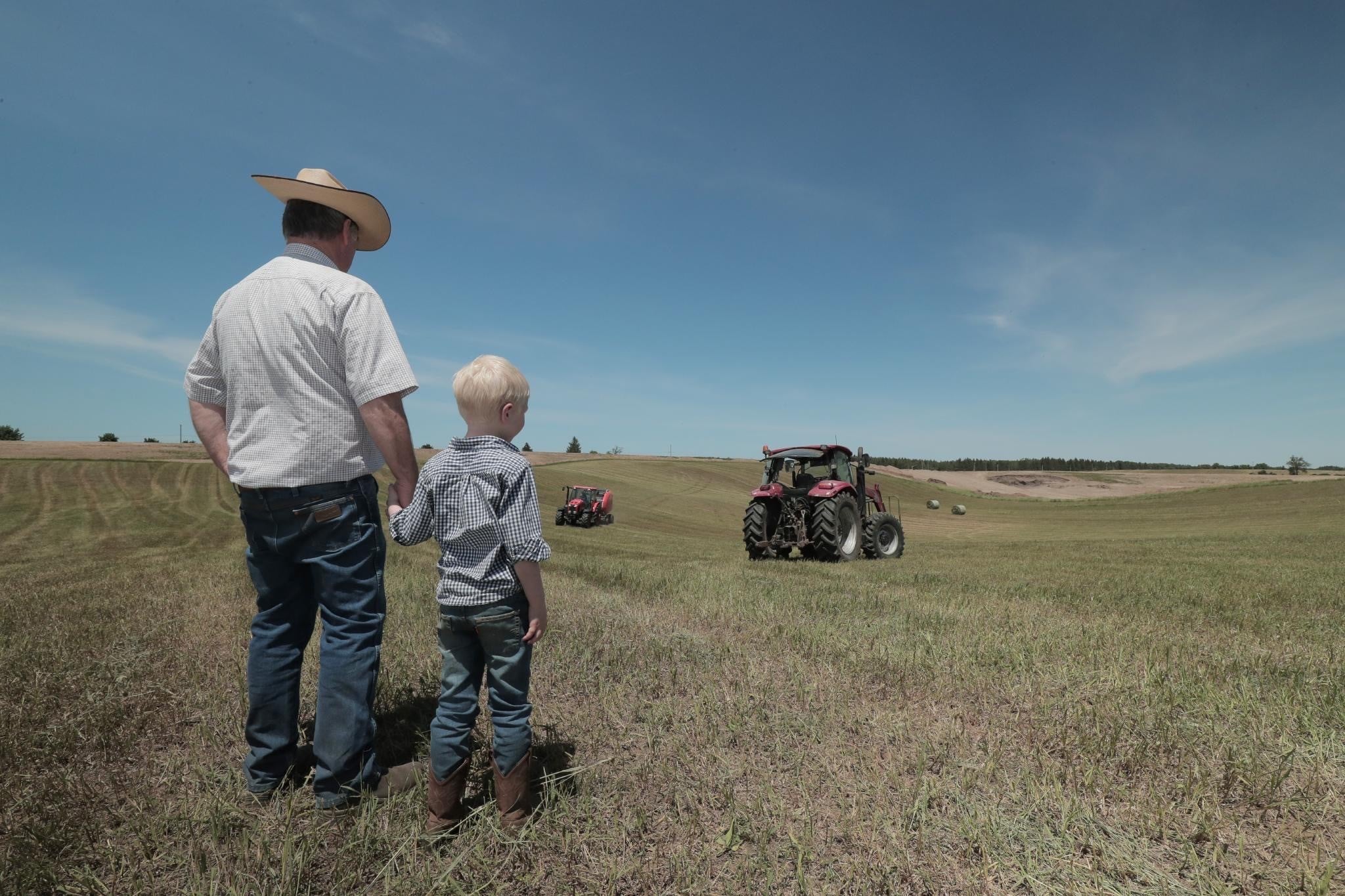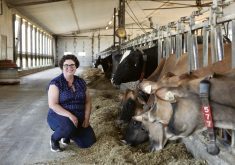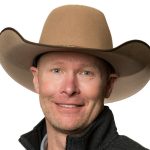Andrew Lovell and Andrea McKenna have a lot in common. They’re both farmers on Canada’s East Coast — Lovell in New Brunswick and McKenna on P.E.I. — and they’re both insanely busy.
When Country Guide first reached Lovell, for instance, he hopped off his tractor and continued doing chores wearing a hands-free headset to keep the conversation rolling, and when we phoned McKenna she had just finished a round of harvesting while simultaneously watching two kids. Neither surprised us. Other farmers wouldn’t have been surprised either.
Nor is it a surprise that both are very good at what they do. Lovell was named Outstanding Young Farmer of the Year at the national level in 2016 and McKenna was named one of Canada’s Influential Women in Agriculture in 2021 for her work as a carrot and turnip farmer as well as manager of East Prince Agri-Environment Association.
Read Also

Where convention and innovation meet
How one Ontario farm is integrating technology into their beef operation.
Another shared trait might be a bit more surprising, though. The two firecrackers, in addition to being trailblazers with their respective farming practices, each have a professional business degree, and those educational programs have largely shaped the trajectory of their careers and in particular, the way they make business decisions around the farm.
For McKenna, it was an MBA from the University of P.E.I. in biotechnology. For Lovell, it was a newer Entrepreneurial leadership program from the Wallace-McCain Institute.
While these programs were different in many ways, there were also a lot of similarities. They featured group work, case studies and an approach that put a number of people from all kinds of different industries in one classroom to provide insights and feedback to one another.
About the programs

McKenna’s MBA in biotechnology from University of P.E.I. came after she had moved to P.E.I. to live and work on a potato farm with her husband. With plenty of experience of her own in the human resources side of the agricultural industry, this degree opened her eyes to evidence-based research and informed decision-making.
It also introduced her to evidence-based management structures. In fact, the program was created with the growing medical and pharmaceutical industry on the East Coast in mind, but she is finding the benefits are easily transferred to the agricultural industry and that there are connections between the two.
The program itself was completed on evenings and weekends and consisted of a lot of group work. Matched up at the beginning of the program into groups of five, participants worked on case studies and with their focus on presentation-style project work instead of exams.
The program wasn’t easy. McKenna says there were definitely many classes and subjects that challenged her, although it was juggling the program on top of work and raising a family that challenged her most.
The Wallace McCain Institute, was founded in 2006 by the school’s namesake, co-founder of McCain Foods. This program is based on the East Coast and has a class size of about 16 selected business owners in each cohort. The year Lovell went, there were 24. They met 12 times in a year, and classes were moderated by entrepreneurs.
In these sessions, business owners set goals and reported back on ones made in previous sessions to meet new targets in their business and run them more efficiently. Lovell likens it to an executive MBA in that you’re working on making better business decisions with people from all kinds of different fields.
In the McCain program, too, these peer groups continue meeting quarterly past the first year, and each student is matched up with a successful mentor in their field. Past mentors have included David Ganong of Ganong Bros. and J. Scott McCain of Maple Leaf Foods.
Soon Lovell found the frequent phone calls and access to proven, successful professionals to be a huge perk and a frequent source of keen insights.
The benefits
So what did these two learn from their respective educational experiences? As it turns out, quite a lot. Here’s the inside scoop on what was revealed, including the power of identifying and becoming adept at exploiting the power of evidence-based, data-driven decision-making.
When McKenna began her MBA degree, her previous history had included working in human resources and looking at training gap issues in Newfoundland’s ag industry via the College of the North Atlantic, and then working and living on her husband’s farm in PEI.
Determined to go even further in an already successful career, she committed to the MBA in biotechnology.
“The focus of my MBA is on evidence-based management structures, and that’s what I do today,” says McKenna, referring to her work as manager of East Prince Agri-Environment Association where she connects farmers with a wide variety of researchers to drive business-related decision-making and environmentally responsible farming.
“I learned to use evidence to make decisions as much as possible … the degree was helpful because it really went into the science of decision-making.”
Living and working on the farm while simultaneously doing her degree, McKenna was constantly able to relate what she was learning to the day-to-day decision-making on the farm too.
“In the agriculture industry, a lot of decisions are based on experience and trial and error … when I realized the importance of getting as much realistic and scientific data as possible, I came to see that as my opportunity to help these farms (the growers she helps through East Prince Agri-Environment Association) and our own farm.”
On farms, of course, opportunities for growth raise questions of revenue and income. As a result of the program, she says, “I see lots of opportunity for growth … no one can survive without food so as farmers we need to continuously grow and adapt to changes. Most importantly we need to figure out how to do more with less because the world’s population is growing but the land we have to work with is finite.”
Setting business goals
For Andrew, his introduction to Wallace McCain came in 2017 for the one-year program. At the time he was running a successful orchard but was dealing with a huge need for recovery after deer damage caused a 50 per cent loss of his crop in 2014. Looking to diversify his revenue stream, McKenna expanded his orchard to more of an agri-tourism venture to make up some of that loss in the meantime.
However, while the strategy proved very successful, Lovell also found himself being pulled in a lot of different directions.
Enter stage left, a degree that would provide him with focus and goal-setting, with 24 people in his class and 12 sessions. Each session looked at a different topic: financials, human resources and dealing with staff, for example.
Lovell is quick to say that he got a lot out of each of these sessions and that he was able to implement a great deal of it, but the best part was setting goals and specific targets to reach in his business each month
For example, as a result of the program’s goal-setting and strategies, Lovell increased the size of his orchard but also focused on a lucrative snow-removal opportunity. In essence, Lovell began directing his time and investment to parts of the business that would fund and drive his recovery efforts.
Another strength of this goal-setting was that it inspired Lovell to talk with neighbouring food producers about how to sharpen their focus on netting higher prices. It’s a topic he’d often thought about, of course, but now, with goals set in the classroom, he could see opportunities for concrete action.
“Every month, I wanted to achieve the goals I’d set with my group,” says Lovell. “They’d tell you if you were sandbagging it or setting your goals too low. There was no beating around the bush.”
The strengths of different perspectives
Ask practically anyone with a business degree what aspect of their degree delivered the most value, and they’ll say it was the connections they made with fellow students.
That’s what McKenna and Lovell say too, but they also define it a bit better.
While it’s obvious they value their individual connections post-grad, what really came through right from the start was the strength they got from having different perspectives in the room.
As Lovell has come to think of it: “If you’re a business person … you can learn from anyone,” and he also gained insight into manufacturing, transportation and other sectors that, while essential to farming, operate at arm’s length from it.
For McKenna, there were several people in the pharmaceutical and medical community in her program who provided her with different viewpoints and ideas for ways she could apply data to her decision-making on the farm. Not only that, but it helped her see the important connection between farmers and the health care industry and the vital impact they could have working together.
To push that a step further, McKenna noted that getting better at listening and communicating were two byproduct skills she picked up from the program as well.
“I find no matter what the job is, you need to be a good listener to succeed,” says McKenna. “Whether it’s managing my farm and our employees, designing research pro-jects with farmers and researchers, or as a student, listening and learning from others is very important.”
As well, she says, “being a good communicator is important. During the MBA program, we did a lot of group work. Listening and effectively communicating with team members were crucial.”















